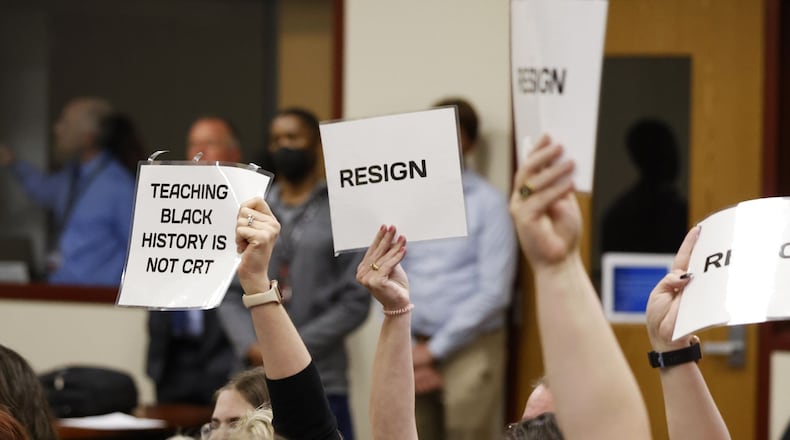The committee’s discussion, which included all five Lakota board members with Isaac Adi participating via a remote link, was sparked in large part by the at-times disruptive atmosphere of the board’s meetings in 2022 and on occasion in this year.
Late in 2022, the board changed is public speaking policy for members of the public under the advice of its legal counsel and in part due to the contentiousness from some meeting audience members surrounding Lakota Superintendent Matt Miller, who resigned last month.
Initially in October, the board cited legal advice in suspending all public comment at meetings, during the 30-minute period allowed at the legal discretion of the board each meeting where residents each have three minutes to speak to the board.
Later the board, which was sued for restricting a resident’s comments earlier in 2022 and then settled the lawsuit, further modified its policy to prohibit any criticism or praise of Lakota employees — excluding the publicly elected board members — as a strategy to try to calm the sometimes raucousness of the public speaking portion of its meetings.
At times in the last year, some members of the public audience have been admonished repeatedly to not shout out.
Lakota Board of Education President Lynda O’Connor had said the new policy from late 2022 would be revisited by the board early this year for possible changes and the board’s recent policy committee was the result of that promise.
O’Connor said at the policy meeting, “I think we’ve had a lot of increased tension and concerns that we’ve talked about, safety concerns, at our meetings.”
Interim Lakota Superintendent Robb Vogelmann echoed O’Connor’s comments and asked “how can we get that … meeting focused so there aren’t people yelling out and interrupting people, either at the (board members’ table) or at the microphone speaking?”
Among the proposals discussed at the committee meeting was the creation of a “public listening session” of 45 minutes to be held prior to each the board’s regular meetings and conducted in a separate room in the same building with all board members attending.
The board is considering a rule that states the traditional 30-minute public speaking portion then “may” be included during its subsequent meeting if the board believed it was needed.
“It is critically important that we still have an opportunity to hear from our community,” said O’Connor. “I am not in favor of doing away with (public comment). If we can shift it to a different time and deal with the safety concerns and the efficiency part, I’m comfortable with that.”
The board committee said the current proposed changes will now be reviewed the district’s legal firm before the possibility of a resolution being presented to the board for a vote during its next regular business meeting on March 6.
About the Author

